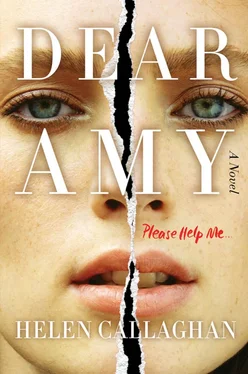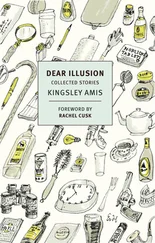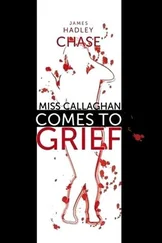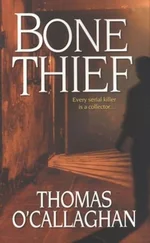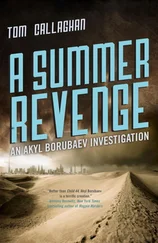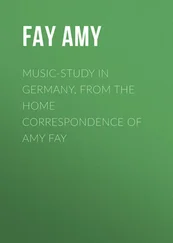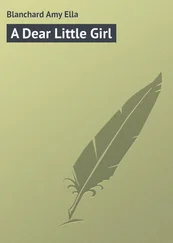Bethan walked quickly, stumbling a little, looking neither right nor left, the hood on her parka drawn up to cover her dark hair.
I wanted to shout out to someone: ‘Stop her, stop her, that’s her!’ but my mouth was sealed and I could make no sound at all. I could only run after her, unable to call her name.
And though she was only walking while I was running, I couldn’t catch up with her, no matter how hard I tried to make up the distance, my feet heavy and slow over the hospital’s tiled floor. She remained just thirty feet ahead, as though she was a bright mirage in the desert of my subconscious.
I was aware of the walls of Addenbrooke’s growing darker and more narrow, the light increasingly dim and orange, and there was the smell of incense, disinfectant and cigarette ends, switching in and out. Voices came from ahead, from the unknowable distance in front of Bethan, a sort of loud chaotic hubbub echoing against the red bricks, and the gold and scarlet murals painted on the ceiling showed a female saint in a man’s toga.
I emerged into a richly decorated space filled with dark wooden pews, and the stained-glass window with its image of St Eugenia, the woman in disguise, let variegated light fall on to all present.
I lingered at the back, unsure of how to proceed. Someone in priest’s vestments was at the altar, but I didn’t want to look up, to meet their gaze. I understood that it was vitally important that he didn’t see me.
The candles flickered all around and the organ began to play as I stared about myself, utterly lost. Bethan appeared to have vanished. The congregation all seemed a little familiar, and I felt that something was insisting that I look at them, notice them too, but then I saw the back of Bethan’s hood, from where she slouched in the front pew, her legs crossed lazily before her and poking sideways into the aisle, her toes in their black Mary Janes flexed skywards.
I hurried up the aisle to the nave, my chin pressed to my chest, careful not to look up and attract the notice of whatever creature was officiating. I pushed myself in almost roughly next to Bethan, determined to get her to come with me away from all of this danger, or at the very least to adopt a more respectful posture in church.
I seized her elbow, and she turned to meet my gaze almost lazily, her hood falling back to reveal her peroxide white hair.
‘Heya, Amy,’ she said, and her eyes were glazed and dead. ‘Want to come to a party?’
I found my voice and I screamed, screamed so loudly that the congregation grew still and everything was silent, except for the ringing, deliberate footfalls of someone stepping down from the altar and slowly coming for us both.
I was woken by church bells and the raucous cries of crows.
My shoulder hurt less, but my limbs were just as heavy. It was very restful, actually, to just lie there and be unable to do anything.
Then I remembered.
‘Martin,’ I shouted, or attempted to. My voice was tremulous and insubstantial.
My car was still in the juggernauts’ graveyard. I had to get it back. I had to get to the police and describe my attacker. I had to get Wendy to forward my mail somewhere safe. I had to… tell Martin that I knew who Bethan Avery was.
I couldn’t see my mobile phone.
I touched my shoulder. It was still a little hot and tender, but the bandages felt far less tight. This gave me so much confidence that I got out of bed and stood up in one motion. I was in the process of taking my first step when the dizziness hit me and I collapsed to the floor. For a moment I couldn’t move at all.
I was so frustrated and angry that I wept hard but silently into the coarse carpet for a few seconds.
Now, now, Margot, you were just a touch too hasty, that’s all. If you stand up slowly then you’ll be all right.
I sat up, slowly. Even this made me feel vague and numb. How the hell could I accomplish anything in this condition? If that thug burst in here right now I would be utterly helpless. This sobering notion gave me renewed strength. Sitting around and crying about it was quite simply not a luxury I could afford.
I tugged down the shoulder of my shirt to examine my injuries with my own eyes. I gently pulled off a little of the tape and lifted the bandage. Even this hurt, the cooler air stinging it. It was a knife cut, a long furrow beginning at the top of my shoulder, and coming down over my chest until it was level with my armpit. It was a perfectly straight line, about a quarter of an inch deep at its widest, with slightly raised edges that were white against the angry red skin surrounding it. Within the lacing of the stitches, the blood within had congealed to a dark ruby red. I peered at it. It looked ugly, but was hardly the death-dealing injury I had mistaken it for. I replaced the bandage carefully, the tape refusing to stick properly again. Sod it.
I stood up, slowly. Far better. I still felt weak and dizzy, but it would pass. I tried to smooth down my tangled, sweaty hair.
The room, now that I saw it in daylight, was small but pretty, with pale blue curtains and a sanded grey wood dresser. This supported a warped antique mirror that threw my reflection back at me at a slightly queer, fun-house angle. A conch shell rested before it.
Nudging aside the curtains, a tiny but beautifully maintained scrap of garden lay below me, edged in dark green hedging. Blue tits and chaffinches were darting in and out of a bird feeder. Beyond the garden were fields, their stubble ploughed under, bounded by a thin ribbon of trees. The landscape was flat, the sky wide – this was the Fens, I understood immediately – but where in the Fens?
It was a beautifully cold, sunny day on the very lip of autumn, before it turns to winter. With my good arm I opened the window. There was a squeal, then the fresh tang of a cold breeze ruffled against my face.
Where was I?
I made it, one foot at a time, to the top of the stairs. On the landing, a trio of plastic crates full of papers, folders and other bric-a-brac stood one atop the other, the debris of a house move, if I was any judge. Getting down the stairs was the worst thing and took the longest time.
Eventually I found myself in a small living room, low ceilinged and crammed with bookshelves. Books burst untidily out of these, stacked up in rows two deep in places, every available nook and cranny full of them – non-fiction, literary novels, a smattering of crime and thrillers with their titles in large block capitals. There was lots of twentieth-century literary biography – De Beauvoir, Sartre, Miller, Hemingway – clearly Martin had a thing for Left Bank writers.
There was also a record collection comprised of real records near the wide-screen television – vinyl, stacked in their own cabinet and with the names on the spines. As I hobbled nearer I could make out the Sex Pistols, the Stranglers and the Clash, which made me smile. So Martin spent his leisure hours mourning the fact he was too young for the punk rock revolution, did he? How adorable.
Stop that, Margot, I told myself sternly.
Everything looked slightly amazed, a little jumbled, as though this was the condensation of the contents of a much larger home.
I had never heard Martin talk of a Mrs Forrester, but to me this looked like the pad of a divorcee rather than a bachelor, with its sense of belongings decanted into a smaller space than they were used to.
A pair of glass doors led to the little garden, and in the middle of the room stood a low coffee table surrounded by a sofa and chairs. A remote for the expensive stereo and a glass bowl full of coins and keys lay on top of it, but despite the genial messiness, there was no sign of any dust – I suspected he got someone in to clean as he didn’t strike me as a neat freak.
Читать дальше
